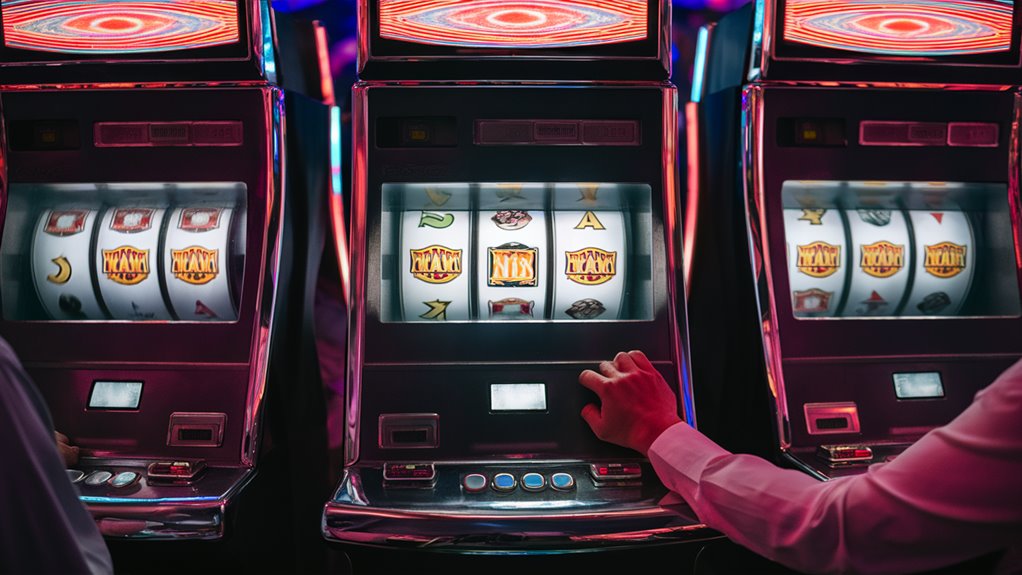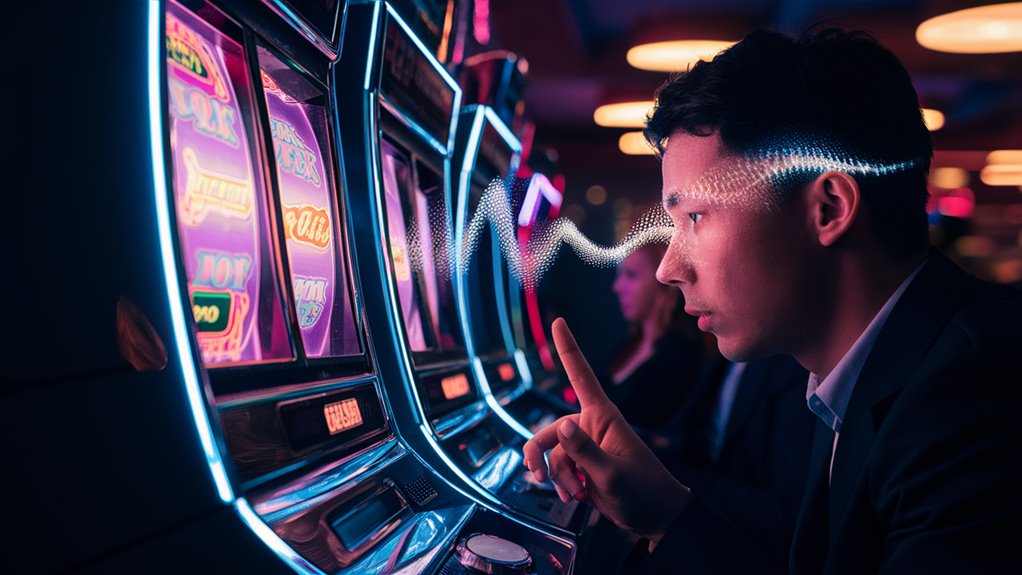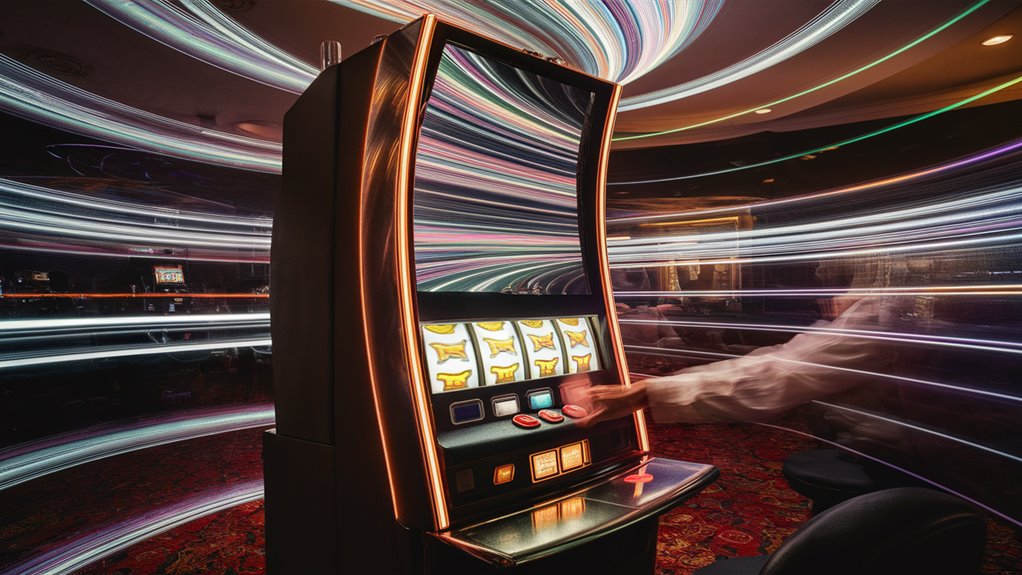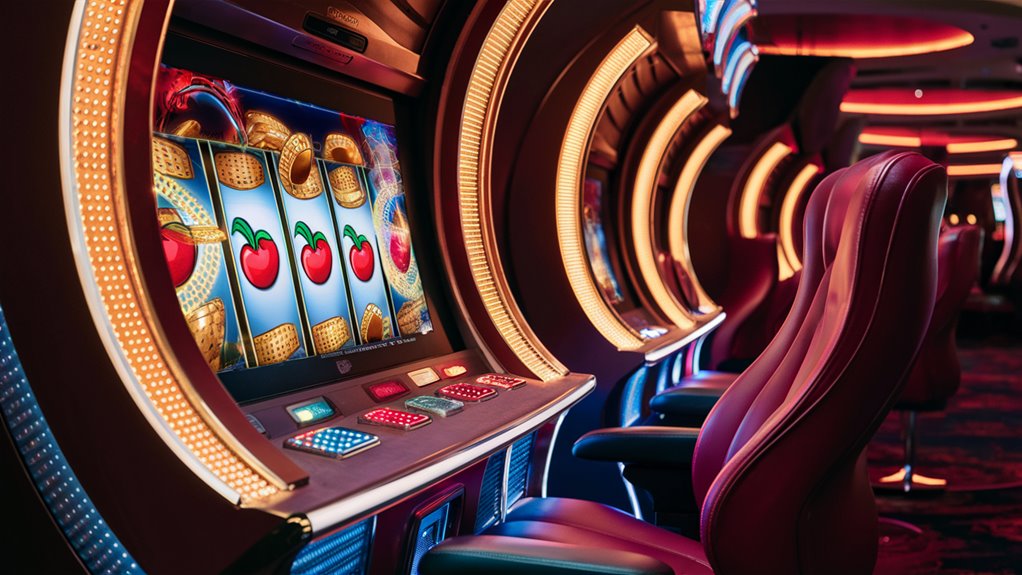How Do Slot Machines Use Psychology to Keep Players Engaged?
Key Takeaways
- Slot machines utilize specific cognitive triggers to activate the brain’s reward system
- Strategic design elements like sounds and near-misses influence player behavior
- Understanding these psychological tactics helps players make informed decisions
Slot machines combine carefully engineered psychological triggers with precise timing mechanisms to create an engaging player experience. The machines employ several core cognitive elements that directly impact player behavior:
Strategic Sound Design
- Celebratory sounds during wins
- Encouraging audio feedback during near-misses
- Continuous background music to maintain excitement
Visual Engineering
- Bright, dynamic displays
- Strategic placement of symbols
- Animation sequences that create anticipation
Reward System Integration
- Variable ratio reinforcement schedules
- Near-miss events that encourage continued play
- Small, frequent wins to maintain engagement
Player Psychology Elements
- Immediate feedback loops
- Loss disguised as wins
- Pattern recognition triggers
The psychological design extends beyond basic gameplay mechanics. Players encounter:
- Personalized messaging
- Progressive reward systems
- Social proof elements
- Achievement unlocks
These design features work together to create a highly engaging experience that keeps players invested in the game. Understanding these mechanisms helps players recognize how their decision-making process is influenced during gameplay.
The Psychology of Variable Rewards

How Do Variable Rewards Shape Human Behavior?
Key Takeaways
- Variable rewards trigger higher dopamine release than fixed rewards
- Unpredictable reward patterns create stronger behavioral reinforcement
- Gaming and tech industries leverage this psychology for user engagement
- Understanding this mechanism helps recognize and manage addictive patterns
Variable rewards create powerful behavioral patterns by triggering the brain’s dopamine system through unpredictable outcomes.
This psychological mechanism affects everything from smartphone habits to gambling behaviors, making it a crucial factor in modern digital engagement.
The Science Behind Variable Rewards
The human brain evolved to detect patterns and predict outcomes as a survival mechanism.
When rewards come at random intervals, rather than fixed times, the brain releases more dopamine – our primary motivation neurotransmitter. This explains why:
- Checking phone notifications becomes compulsive
- Social media feeds are highly engaging
- Email inbox refreshing becomes habitual
- Gambling can be particularly addictive
How Industries Apply Variable Rewards
Gaming and tech companies implement variable reward systems through:
- Carefully calibrated reward timing
- Strategic placement of “near-miss” experiences
- Intermittent positive reinforcement
- Balanced win-loss ratios
Recognizing and Managing Variable Reward Patterns
To maintain healthy engagement with variable reward systems:
- Set strict time limits for activities involving variable rewards
- Track usage patterns of apps and games
- Recognize when engagement becomes compulsive
- Create alternative reward systems with predictable outcomes
Understanding this psychological mechanism helps users make informed decisions about their digital habits and entertainment choices while recognizing potentially addictive patterns in everyday activities.
Near-Miss Effect on Player Behavior

How Do Near-Misses Affect Gambling Behavior?
Key Takeaways
- Near-misses trigger dopamine responses similar to actual wins
- Players often misinterpret near-misses as signs of upcoming success
- Slot machines are specifically designed to create these almost-win moments
- These experiences typically lead to increased betting and longer play sessions
Understanding the Near-Miss Psychology
Near-miss effects in slot machines create powerful psychological triggers when players almost hit winning combinations.
These moments activate reward centers in players’ brains, causing them to process these losses as “almost winning” rather than the actual losses they represent.
How Slot Machines Engineer Near-Misses
Slot machine manufacturers intentionally program these near-miss experiences into their games.
A common technique displays two jackpot symbols on the payline with the third symbol stopping just above or below, creating an artificial sense of almost winning. This strategic placement triggers neurological responses remarkably similar to genuine wins.
Impact on Player Behavior
Near-misses significantly influence how players interact with slot machines:
- Extended playing sessions
- Increased bet sizes
- Enhanced motivation to continue gambling
- False perception of skill development
The brain incorrectly processes these close calls as learning experiences, creating an illusion of skill development in what’s actually a chance-based activity.
Players often believe they’re getting closer to winning, despite the random nature of slot machine outcomes. This misperception drives continued play and higher stakes, making near-misses a crucial element in gambling engagement.
Sound Design and Brain Response

How Do Sound Effects Impact Player Psychology in Slot Machines?
Key Takeaways
- Carefully designed sound effects trigger dopamine release in players’ brains
- Celebratory sound stacking creates an illusion of frequent wins
- Strategic volume manipulation enhances social proof and player engagement
- Audio-visual combinations form powerful reward anticipation loops
The Science Behind Casino Sounds
Sound design in slot machines directly activates specific neural pathways, enhancing player excitement and engagement.
Modern slot machine manufacturers strategically craft each audio element – from chimes to bells and musical flourishes – to stimulate dopamine production in the brain.
Even in digital machines, the classic sound of dropping coins creates powerful reward associations.
Understanding Sound Stacking Technology
Slot machines employ “celebratory sound stacking,” where winning combinations trigger multiple layers of audio effects.
These layered sounds become progressively more complex and euphoric, playing during both genuine wins and near-misses. This technique creates a perception of success even when players don’t exceed their original bet.
Volume and Social Psychology
Strategic volume control plays a crucial role in the slot machine experience. Winning sounds deliberately rise above the casino’s ambient noise level, accomplishing two key objectives:
- Drawing attention from nearby players
- Creating social proof through shared excitement
- Reinforcing the perception of frequent wins
This sophisticated audio engineering works alongside visual elements to create what neuroscientists term a “reward anticipation loop,” making each spin feel more meaningful and engaging to players.
The combination of sound design and visual feedback keeps players invested in the gaming experience, regardless of actual outcomes.
Time Distortion During Gameplay

How Do Slot Machines Manipulate Time Perception During Gameplay?
Key Takeaways
- Slot machines use 3-4 second spin 먹튀검증 커뮤니티 추천 cycles to create hypnotic gameplay rhythms
- Time distortion techniques lead to longer playing sessions and increased spending
- Animation speeds vary between wins and losses to alter time perception
- The “zone” state occurs through continuous gameplay and intermittent reinforcement
Understanding Time Manipulation in Slot Machines
Slot machines employ sophisticated psychological techniques to alter players’ perception of time, creating an environment where minutes can feel like seconds.
Modern slots combine rapid spin cycles with strategic animation speeds to achieve this effect.
The Science Behind Rapid Gameplay
The typical 3-4 second spin cycle creates a hypnotic rhythm that disrupts normal time awareness. This quick-paced gameplay eliminates natural break points through:
- Automatic credit loading
- Instant replay options
- Continuous gameplay loops
- Intermittent reinforcement from small wins
Strategic Animation Speeds
Slot machines utilize variable timing to enhance the gaming experience:
- Wins: Slower animations stretch out positive moments
- Losses: Quick animations minimize negative experiences
- Result: Creates “temporal compression” where time awareness diminishes
The Zone State
Players enter a trance-like state called “the zone” through:
- Continuous gameplay mechanics
- Absence of external time cues
- Regular small wins
- 카지노 색체 심리학
- Hypnotic sound and visual effects
This combination of time manipulation techniques effectively extends gaming sessions and increases player engagement, making slot machines particularly effective at keeping players at the machine for longer periods.
Visual Triggers in Machine Design

How Do Visual Elements in Machine Design Influence Player Engagement?
Key Takeaways
- Strategic visual triggers create immersive gaming environments
- Carefully positioned visual elements maximize player attention
- Design elements like animations and colors drive emotional responses
- Familiar themes and symbols build instant player connections
Understanding Visual Design Elements
Modern gaming machines utilize orchestrated visual components to optimize player engagement.
Visual design combines strategic animations, lighting patterns, and color schemes to create an environment that naturally draws and maintains player focus.
Strategic Visual Placement
Visual element positioning follows specific psychological principles:
- Betting options and paylines appear at natural eye level
- Bonus features and jackpots sit slightly above eye level
- Attract mode demonstrations use timed light sequences
- Upward-scrolling reels suggest progress and achievement
Animation and Color Psychology
Key visual triggers incorporate proven psychological techniques:
- Rapid-fire animations maintain sustained attention
- Animated rewards reinforce positive emotions
- Vibrant colors create heightened excitement
- Near-miss displays build anticipation
Theme Integration and Player Connection
Emotional engagement occurs through:
- Popular entertainment themes
- Nostalgic symbols and imagery
- Familiar cultural references
- Strategic placement of winning symbols
The combination of these visual elements creates an optimized gaming environment that maintains player interest while delivering clear information about gameplay options and potential rewards.